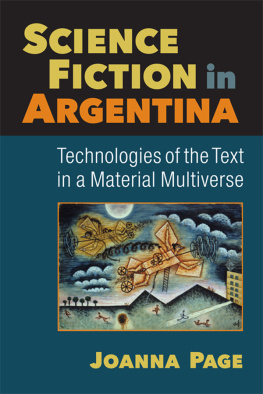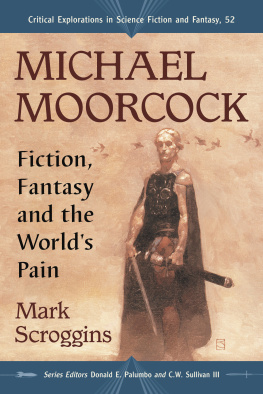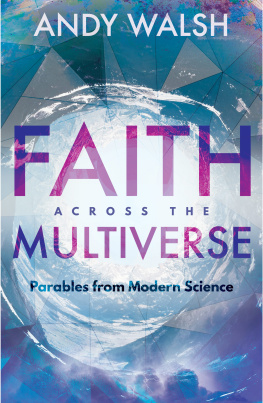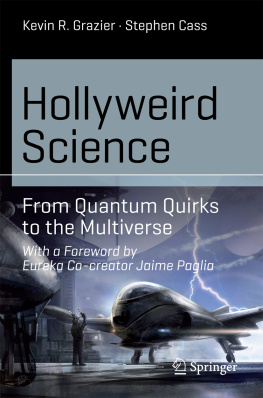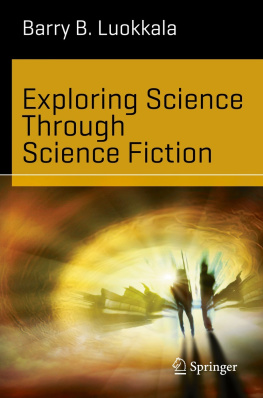Joanna Page - Science Fiction in Argentina: Technologies of the Text in a Material Multiverse
Here you can read online Joanna Page - Science Fiction in Argentina: Technologies of the Text in a Material Multiverse full text of the book (entire story) in english for free. Download pdf and epub, get meaning, cover and reviews about this ebook. year: 2018, publisher: University of Michigan Press, genre: Romance novel. Description of the work, (preface) as well as reviews are available. Best literature library LitArk.com created for fans of good reading and offers a wide selection of genres:
Romance novel
Science fiction
Adventure
Detective
Science
History
Home and family
Prose
Art
Politics
Computer
Non-fiction
Religion
Business
Children
Humor
Choose a favorite category and find really read worthwhile books. Enjoy immersion in the world of imagination, feel the emotions of the characters or learn something new for yourself, make an fascinating discovery.
- Book:Science Fiction in Argentina: Technologies of the Text in a Material Multiverse
- Author:
- Publisher:University of Michigan Press
- Genre:
- Year:2018
- Rating:5 / 5
- Favourites:Add to favourites
- Your mark:
- 100
- 1
- 2
- 3
- 4
- 5
Science Fiction in Argentina: Technologies of the Text in a Material Multiverse: summary, description and annotation
We offer to read an annotation, description, summary or preface (depends on what the author of the book "Science Fiction in Argentina: Technologies of the Text in a Material Multiverse" wrote himself). If you haven't found the necessary information about the book — write in the comments, we will try to find it.
Joanna Page: author's other books
Who wrote Science Fiction in Argentina: Technologies of the Text in a Material Multiverse? Find out the surname, the name of the author of the book and a list of all author's works by series.
Science Fiction in Argentina: Technologies of the Text in a Material Multiverse — read online for free the complete book (whole text) full work
Below is the text of the book, divided by pages. System saving the place of the last page read, allows you to conveniently read the book "Science Fiction in Argentina: Technologies of the Text in a Material Multiverse" online for free, without having to search again every time where you left off. Put a bookmark, and you can go to the page where you finished reading at any time.
Font size:
Interval:
Bookmark:

Page ii DIGITALCULTUREBOOKS, an imprint of the University of Michigan Press, is dedicated to publishing work in new media studies and the emerging field of digital humanities.
Page iiiJoanna Page
University of Michigan Press
Ann Arbor
Page iv Copyright 2016 by Joanna Page
Some rights reserved

This work is licensed under the Creative Commons Attribution-Noncommercial-No Derivative Works 3.0 United States License. To view a copy of this license, visit http://creativecommons.org/licenses/by-nc-nd/3.0/ or send a letter to Creative Commons, 171 Second Street, Suite 300, San Francisco, California, 94105, USA.
Published in the United States of America by the
University of Michigan Press
A CIP catalog record for this book is available from the British Library.
Library of Congress Cataloging-in-Publication Data
Names: Page, Joanna, 1974 author.
Title: Science fiction in Argentina : technologies of the text in a material multiverse / Joanna Page.
Description: Ann Arbor : University of Michigan Press, [2016] | Includes bibliographical references and index.
Identifiers: LCCN 2015044531| ISBN 9780472073108 (hardback : acid-free paper) | ISBN 9780472053100 (paperback : acid-free paper) | ISBN 9780472121878 (e-book)
Subjects: LCSH: Science fiction, ArgentineHistory and criticism. | Literature and technologyArgentina. | Fantasy fiction, ArgentineHistory and criticism. | BISAC: LITERARY CRITICISM / Science Fiction & Fantasy. | LITERARY CRITICISM / Caribbean & Latin American.
Classification: LCC PQ7707.S34 P34 2016 | DDC 860.9/35882dc23
LC record available at http://lccn.loc.gov/2015044531
http://dx.doi.org/10.3998/dcbooks.13607062.0001.001
Page v To my brother,
who came into this world to disrupt my neat ordering of it,
a talent I now admire.
Page vi The entire soul, then, must consist of tiny
atoms, strung out through sinews, vitals, veins.
Lucretius, On the Nature of Things
Page viiPage viii
Page ixParts of this book were written during a period of extended research leave in 2012, funded by the British Academy, and I am extremely grateful for the peaceful and productive time this afforded me. Research trips to Argentina were also funded by Robinson College and the Centre of Latin American Studies. While working on this book I benefited enormously from the friendship and helpful advice of many colleagues in Argentina, including Cristina Reigadas, Clara Kriger, Sandra Gasparini, Carlos Gamerro, Federico Lorenz, and Pablo Piedras. Cecilia Gil Marino aided me in tracking down some of the more elusive materials that formed the basis of my research for the first chapter in particular.
Closer to home, a symposium organized by Ian James in 2013 in Cambridge, Science and Technology in Contemporary French Thought, opened up some fruitful paths of research. Gerald Moore was very generous in sharing his expertise on Stiegler with me, and I am also grateful to Ed King for his feedback on a draft of the second chapter and for the inspiration of his own work on graphic fiction.
Early versions of some of the material contained in this book have been published, or are forthcoming, in journals and edited volumes. The section on Holmberg formed the basis of an article in Spanish to be published with the title Reflexividad en la obra de Eduardo Holmberg: El rol de la ciencia ficcin y la fantasa en la modernizacin y el control de las masas in a special issue of the Revista iberoamericana, La ciencia ficcin en Amrica Latina: Aproximaciones tericas al imaginario de la experimentacin cultura. The section on El Eternauta is drawn from an article entitled Intellectuals, Revolution and Popular Culture: A New Reading of El Eternauta, published Page x in Journal of Latin American Cultural Studies 19, no. 1 (March 2010). Part of chapter 6 appeared in Arizona Journal of Hispanic Cultural Studies 16 (2012) and another part in a compilation of essays edited by Jennifer Feeley and Sarah Wells with the title Simultaneous Worlds: Global Science Fiction Cinema (University of Minnesota Press, 2015). I am grateful to the publishers for their permission to reproduce this material.
Page 1Argentine science fiction does not exist. This claim, the opening statement of Elvio E. Gandolfos chapter on the subject in El libro de los gneros,
The view that science fiction is insufficiently developed as a genre in Argentina is perhaps an understandable response to the overwhelming dominance of generic models from the United States and Europe. The association of science fiction with foreign, imported literature is reinforced in the categories used by publishers and booksellers in Argentina: the shelves dedicated to science fiction in bookshops are exclusively stocked with literature in translation, while even widely acknowledged Argentine practitioners of the genre, such as Anglica Gorodischer and Carlos Gandini, are relegated to the literatura nacional section. If science fiction has still to be recognized as a genre within national literature, this is partly because many of its most distinguished authorsLeopoldo Lugones and Adolfo Bioy Casares, for exampledid not exclusively dedicate themselves to the genre, but also because they and other writers have not, unlike in the United States, become Page 2 the target of marketing campaigns that have relied on the strategic labeling (and retro-labeling) of texts as SF.
Critics have followed suit in downplaying the presence of science fiction in Argentina and reinforcing an overly restrictive genre classification. This has led to a dearth of critical work on the subject that might create new and alternative genealogies within Argentine literature; among other omissions, it has also sidelined a very important flourishing of the genre in graphic fiction, for example, of which Oesterhelds El Eternauta may be the most famous but certainly not the only example. I find sufficient the simple definition of science fiction offered by Capanna (borrowing from Judith Merril) as la literatura de la imaginacion disciplinada (literature of the disciplined imagination), which describes texts that apply a scientific logic to explore even the most fanciful of hypotheses, and scrupulously avoid supernatural explanation. By suggesting that these questions are somehow out of place in science fiction, however, she seems to ignore the fully fledged critique of modernity and technologization that also exists within mainstream First World science fiction (in which atavism is by no means a rare threat, for example), and to imply that the genre is necessarily tied to a certain ideology and state of development.
It is certainly the case that Argentine science fiction is most often of the soft rather than the hard variety, bringing social or political issues to the fore rather than adopting a rigorously scientific approach to imagined technologies or advanced theoretical work in physics. There are no equivalents to the detailed expositions of complex mathematics or quantum ontologies in Greg Egans Diaspora (1997) or Schilds Ladder (2002), or the advanced astronomical knowledge that underpins Alastair Reynoldss Revelation Space Universe. Argentine science fiction is far more likely to engage in speculation concerning posthuman identities or the social or psychological impact of new technologies of simulation and artificial life, along the lines of Philip K. Dicks
Font size:
Interval:
Bookmark:
Similar books «Science Fiction in Argentina: Technologies of the Text in a Material Multiverse»
Look at similar books to Science Fiction in Argentina: Technologies of the Text in a Material Multiverse. We have selected literature similar in name and meaning in the hope of providing readers with more options to find new, interesting, not yet read works.
Discussion, reviews of the book Science Fiction in Argentina: Technologies of the Text in a Material Multiverse and just readers' own opinions. Leave your comments, write what you think about the work, its meaning or the main characters. Specify what exactly you liked and what you didn't like, and why you think so.

